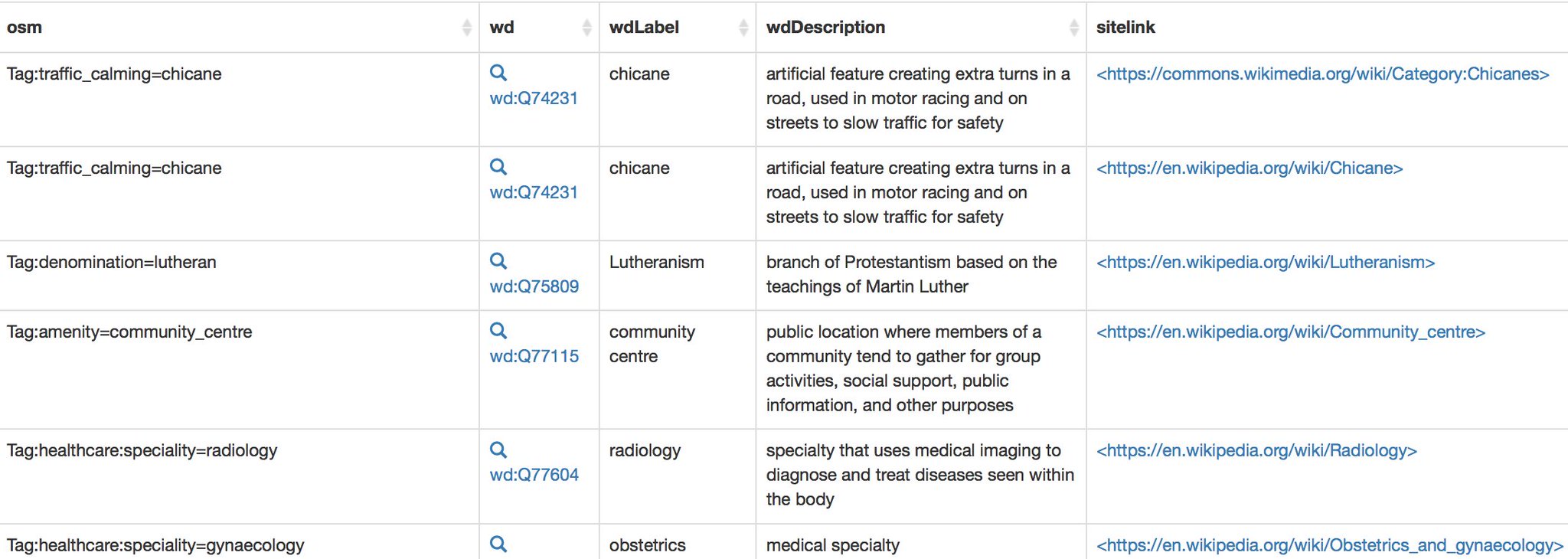Descriptions of OSM tags in any language using Wikidata
Posted by PlaneMad on 10 January 2018 in English. Last updated on 12 January 2018.Ever wanted documentation of OSM tags in your own language?

Thanks to Wikidata, this might be quite simple: OSM tags in Japanese | German | English
(Hit edit query to change to your language)
If you find a missing tag or translation, you can add it by editing the relevant Wikidata item and adding a new translation or a new OSM tag property.
The post was inspired by a recent discussion on OSM wiki questioning the value of Wikidata links on the wiki pages. Atleast in my part of the world, this is going to be quite useful since the Wiki pages have not been translated into my language.
Note It is known that OSM tags don’t always map 1:1 exactly with existing Wikidata concepts and such derived definitions need further review to make sure it is consistent with the OSM Wiki. In such cases a new concept can be created in Wikidata if it does not overlap with any existing definition.

Discussion
Comment from SomeoneElse on 10 January 2018 at 12:31
Or you could just translate the text of the OSM wiki page using an online translation tool? The problem with using wikipedia / wikidata for this is that the words that OSM uses to describe things often don’t match the dictionary definition (in any language, even British English) of those things, even for basic things like “city”.
Obviously online translation quality varies by language, and not all languages have available online translations but by using the OSM wiki text rather than source data from wikipedia (which is where 99% of wikidata came from) it’ll at least describe OSM, rather than something that might appear the same but actually is subtly different.
Comment from Sam Wilson on 10 January 2018 at 23:42
But with these Wikidata items, someone as added the “OpenStreetMap tag or key” property (P1282), which means that there is a solid semantic equivalence between the OSM tag and the Wikidata label (of course, still perhaps not 100%).
So for example “footpath” (Q3352369) equates to “highway=footway” and not “footway=sidewalk” which is linked to “sidewalk” (Q177749).
Comment from Tordanik on 11 January 2018 at 17:57
It’s definitely a cool demonstration of what’s possible with Wikidata! I’d like to see more projects make use of the many links between the OSM and Wikidata ecosystems, so in that light, it’s no doubt a great project. :)
When it comes to the reliability of the resulting translations, though, I feel SomeoneElse’s objections are, at least currently, justified. It’s true that there ought to be a semantic equivalence between a tag and the linked Wikidata item, but wiki editors are often tempted to link items that don’t match precisely. To use an example from your post, traffic_calming=chicane is linked to “chicane”, defined as “artificial feature creating extra turns in a road, used in motor racing and on streets to slow traffic for safety”. But as far as I know, the traffic_calming key is not intended for motor racing, which would make this a false equivalence.
There are also cases where the Wikidata definition is a good match, but translated terms can still be misleading. For example, you mention footway=sidewalk and Q177749, where the German label is “Gehweg”. This term is ambiguous: While it often means “sidewalk”, it can also mean “footpath” – which might lead to incorrect use of the tag.
Comment from Sam Wilson on 11 January 2018 at 23:31
Hm, good points @Tordanik!
Actually, I think the mention of motor racing in the chicane description shouldn’t actually be there. Descriptions are meant to basically just clarify the label enough so that multiple identical labels can be told apart (e.g. chicane (Q74231) “artificial feature creating extra turns in a road” vs. Chicane (Q76913) “English musician, composer, songwriter and record producer”). I’ve updated it! :-)
And perhaps the item descriptions are a source for inaccuracies, but I hope the item labels are less so. For example, footpath (Q3352369) is ‘Fußweg’, and sidewalk (Q177749) is ‘Gehweg’ — I don’t speak German, but perhaps this helps clarify things?
Anyway, sorry, I hope I’m not sounding critical! I think we’re just agreeing! :-)
Oh, and the other cool thing is to also be able to make links to other ontologies, such as Dentist Q2979300 being linked to Tag:amenity=dentist and http://schema.org/Dentist.
Comment from TheSwavu on 12 January 2018 at 01:02
I’m with @SomeoneElse on this. Just because a user has decided to link a OpenStreetMap wiki page to a Wikipedia page, via WikiData, does not mean that they are the same thing. There are plenty of cases where the Wikipedia definition deviates from the OpenStreetMap concept.
Comment from Sam Wilson on 12 January 2018 at 01:05
Where they’re not the same thing, we should be removing the OSM link as it’s incorrect (and perhaps creating a new Wikidata item that does represent the correct concept).
Comment from TheSwavu on 12 January 2018 at 01:08
Sure @Sam Wilson, why not get into a never ending edit war with a WikiData fan boy? Sounds like a great use of my time ;-)
Comment from PlaneMad on 12 January 2018 at 06:25
Wikidata is flexible enough to allow anyone to create a new concept if it does not overlap with an existing one, so its fairly easy to correct the definition in such situations to align almost perfectly with the OSM concept.
Comment from SomeoneElse on 12 January 2018 at 14:49
@PlaneMad Agreed that we could create wikidata entries for every “OSM tag XYZ” as distinct from “the English concept XYZ”; I’m just not clear what that buys us over and above an existing OSM wiki article that can be translated into other languages? It just makes the whole thing harder to maintain.